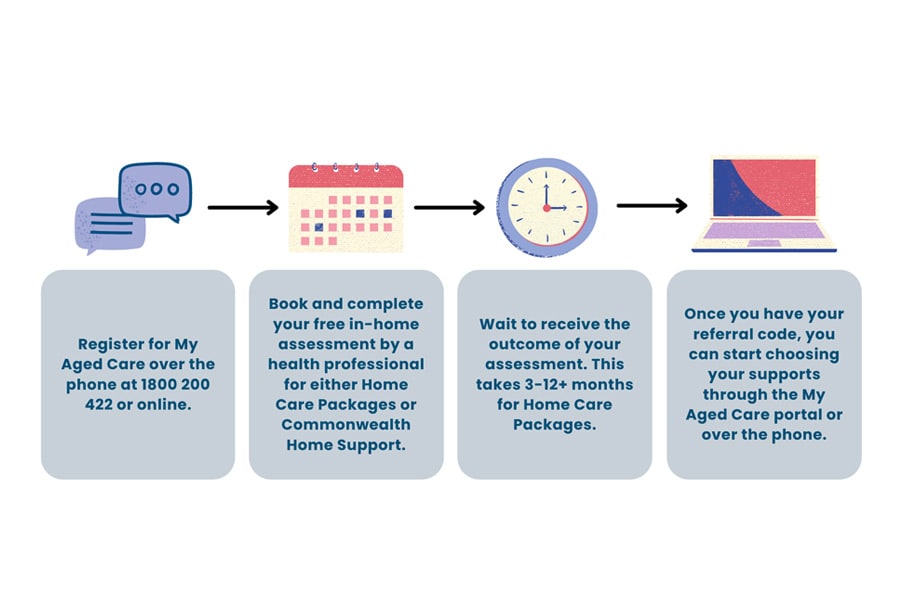How to access aged care services
- Home
- People over 65
- How to access aged...

Government-funded aged care services are available to Australians over 65 and to Aboriginal and Torres Strait Islanders over 50, who are registered on my Aged Care to assist with their daily lives.
When should I register for My Aged Care?
It’s best to register before you need it. Life is unpredictable, so it can be reassuring to know you can access the services you need immediately if the situation arises.
It allows you to find the right providers. Choosing the right provider for you is incredibly important as they will be supporting you to continue living at home independently.
You can complete this 5-minute questionnaire to determine if you are eligible.
How do I get started?
Accessing aged care services will require you to go through a process:
- Registering to My Aged Care
- Having an in-home assessment
- Choosing your provider
1. Registering for My Aged Care
You can register over the phone at 1800 200 422 or online at My Aged Care.
If you have a hearing or speech impairment, you can use the National Relay Service at 1800 555 660. If you need a translator, you can also contact the Translating and Interpreting Service at 131 450.
The registration process usually takes 15-20 minutes and you can apply yourself, or a friend or family member can do so on your behalf.
Through this process, you will:
- Provide personal details, like your Medicare number and phone number
- Provide information about your current situation, like your daily routine and how you manage your daily tasks
- Book a free in-home assessment to determine the level of support you need
2. Having an in-home assessment
When you finish registering, you will be asked to book your free in-home assessment, which is conducted by a healthcare professional. My Aged Care will suggest the type of assessment for you based on the answers you provide in step 1.
The purpose of this assessment is to understand your situation and determine the level of support you require. The assessment can be through either:
- The Regional Assessment Service (RAS)
- the Aged Care Assessment Team (ACAT)
What’s the difference between RAS and ACAT? Simply, RAS assessments are for more entry-level services through the Commonwealth Home Support Service (CHSP) while ACAT assessments are for people who require comprehensive support through Home Care Packages.
Now you wait for the outcome of your assessment. The wait time varies between the two types of assessments.
RAS Assessment (CHSP): You are often notified of the outcome on the day of the assessment with your referral code.
ACAT (HCP): There is usually a wait time. Within 2-6 weeks, you will receive a letter informing you of the outcome and the level of support and services available to you. You will be added to a national waitlist of people who are also waiting for HCP services. This means you won’t receive services right away.
Depending on your HCP level, the wait time varies:
- Level 1 HCP – 3-6 months
- Level 2, 3 or 4 HCP – 12 months or longer
You will be informed of your priority level on the waitlist in your outcome letter. Your priority level is based on your needs, circumstances and whether you require urgent care.
Once you reach the top of the waitlist, you will receive another letter from My Aged Care with your referral code.
4. Choosing your provider
Once you receive your referral code from My Aged Care, you can start organising your supports!
You can research the available providers through Service Finder at My Aged Care or 1800 200 422.
To apply for services, you can either go through the My Aged Care portal online or call your chosen provider directly with your referral code to get everything started.
